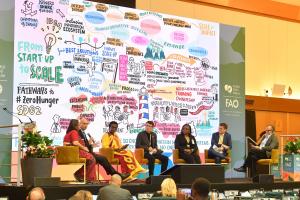Heifer International’s Africa Head Urges Leaders at the World Food Forum to Strengthen Innovation, Funding, Partnerships
Adesuwa Ifedi advocates for increased innovation and funding collaborations to transform food systems at convention of global stakeholders
Innovation needs to find ways of collaboration and seeking opportunities for leverage, especially in resource constrained environments”
ROME, ITALY, October 24, 2024 /EINPresswire.com/ -- Heifer International1’s Senior Vice President of Africa Programs, Adesuwa Ifedi, has urged global leaders, innovators and the private sector to strengthen innovation, funding and collaborations that advance the development of resilient and equitable food systems, particularly in Africa.— Adesuwa Ifedi
Speaking during a panel discussion titled ‘From Start-Up to Scale: Pathways to Zero Hunger’ at the World Food Forum3 2024 in Rome, Ms. Ifedi emphasized the need for increased collaborative efforts between development organizations and innovators, as well as funding partners, to sustainably scale innovations that address challenges and unlock opportunities in agriculture.
Ms. Ifedi joined other global experts, investors, and visionary leaders at the world's largest annual gathering of agrifood system stakeholders to advance development of food systems. Organised by the United Nations’ Food and Agriculture Organization (FAO), this year’s forum addressed the theme, ‘Good Food for All, for Today and Tomorrow’, and took place October 14 to 18.
Heifer International is a global development organization, which supports smallholder farmers to end hunger and poverty in a sustainable way. Leveraging technology and innovation, and working with key government, development partners and local communities, is core to this effort.
“We have worked alongside smallholder farmers globally for 80 years, and in Africa for 50 years, and this experience has shown us how to bring and sustain innovation especially in fragile and poor infrastructure environments,” said Ms. Ifedi. “In the past couple of years, we have begun to operate as innovation brokers — bringing in innovation, supporting it to go into communities, supporting the communities to give feedback, which helps in the rethinking, redesigning and adapting of that innovation and then taking it to scale.”
According to Ms. Ifedi, the lessons from this approach have shown that the more development organizations and innovators collaborate to leverage resources and individual strengths, and funders become more systemic and collaborative, transformational innovations reach scale faster and impact food systems.
“We cannot innovate in silos. The whole ecosystem has to connect,” she said. “This means we need more extensive collaborations because the real world is connected in a systemic way. Innovation needs to find ways of collaboration and seeking opportunities for leverage, especially in resource constrained environments.”
“We also have an adaptation challenge. At Heifer, we work with a lot of local innovators. Local innovators understand context and innovating from ground up, but often don’t have the relevant technology know-how to disrupt effectively. Global innovators, on the other hand, have access to all the best ways of thinking and disrupting and integrating technology; but they often lack local context. So, for innovation adaptation to be effective, the local and international innovators must come together to leverage the strengths of both.
“There is also the issue of finance. Funding also has to become collaborative and innovative. We need to fund innovation creatively and funding has to be systemic and address the power dynamics.”
Giving an example of how increased collaborative funding takes innovations to scale at the last mile, Ms. Ifedi showed how Heifer’s partnership with Hello Tractor, an agritech startup that emerged a regional winner of Heifer’s influential agribusiness competition — Agriculture, Youth and Technology (AYuTe) Africa NextGen — scaled mechanization in the continent.
“AYuTe helps us identify innovators working on reaching the last mile and then we use our catalytic financing to test out that innovation,” she said. “The catalytic financing we did over a period of three years in Hello Tractor has attracted commercial capital which has helped to scale the innovation. Catalytic investment will go in first where commercial capital will not go, but we need a buffet of both for innovation to really scale in the last mile.”
Heifer launched the AYuTe Africa NextGen initiative in 2021 to drive agribusiness innovation. The program supports young African entrepreneurs in developing agritech solutions to address smallholder farmers’ challenges, providing necessary incubation and financing. The AYuTe Africa Challenge, an annual competition under this initiative, awards grants and offers ongoing support and mentorship to strong growth stage agritech innovators.
Ms. Ifedi thanked the FAO for its exemplary role in advancing increased collaborative effort by stakeholders for solving challenges in agriculture. “We are hoping to see a more collaborative ecosystem that leverages each other’s knowledge, experience, and/or expertise as we rethink innovation in agriculture,” she said.
About Heifer International
Since 1944, Heifer International has worked with more than 46 million people around the world to end hunger and poverty in a sustainable way. Heifer currently operates in 19 countries across Africa, Asia, and the Americas, including the United States, supporting farmers and food producers to strengthen local economies and build secure livelihoods that provide a living income. For more information, visit: https://www.heifer.org
Media Contact:
Muthoni Ngure
Regional Communications Coordinator
Heifer International, Africa
Muthoni.ngure@heifer.org
Chinedu Ozordi
Lantern Comitas
email us here
Visit us on social media:
X
LinkedIn
1 http://www.heifer.org/
2 http://ayute.africa
3 https://www.world-food-forum.org/


